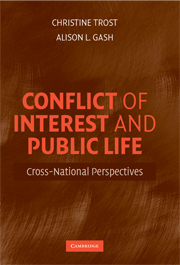Book contents
- Frontmatter
- Contents
- About the Contributors
- Acknowledgments
- Conflict of Interest and Public Life
- Introduction
- PART I THEORETICAL FRAMEWORKS
- PART II CROSS-NATIONAL CASE STUDIES
- FIVE Conflict-of-Interest Legislation in the United States: Origins, Evolution, and Inter-Branch Differences
- SIX Conflict of Interest in Canada
- SEVEN Conflict of Interest in British Public Life
- EIGHT Conflict of Interest in Italy: The Case of a Media Tycoon Who Became Prime Minister (2001–2006)
- NINE Conclusion: Conflict-of-Interest Regulation in Its Institutional Context
- Bibliography
- Index
NINE - Conclusion: Conflict-of-Interest Regulation in Its Institutional Context
Published online by Cambridge University Press: 31 October 2009
- Frontmatter
- Contents
- About the Contributors
- Acknowledgments
- Conflict of Interest and Public Life
- Introduction
- PART I THEORETICAL FRAMEWORKS
- PART II CROSS-NATIONAL CASE STUDIES
- FIVE Conflict-of-Interest Legislation in the United States: Origins, Evolution, and Inter-Branch Differences
- SIX Conflict of Interest in Canada
- SEVEN Conflict of Interest in British Public Life
- EIGHT Conflict of Interest in Italy: The Case of a Media Tycoon Who Became Prime Minister (2001–2006)
- NINE Conclusion: Conflict-of-Interest Regulation in Its Institutional Context
- Bibliography
- Index
Summary
It is difficult to conceive of a general theory of conflict-of-interest regulation because the range of concerns that academics have developed has become extremely broad. Some commentators focus on the mechanics (the appropriate proscriptions for each conflict and the appropriate penalties for each violation), some on the effects (whether it actually works and whether it can be counter-productive), and some on normative aspects (how broadly the concept should apply in terms of officeholder interests and behavior). The analysis here does not attempt to solve these separate problems in a single synthesis, but rather takes the discussion to a higher level of abstraction. It seeks to understand why conflict-of-interest regulation seems to pose difficult problems of institutional and legal choice, and why its effectiveness is so disputed. It does so by setting conflict of interest in its institutional context and by showing how different institutional contexts affect judgments about some of the fundamental areas of contention. These include the extent to which regulation should take place according to hard law or under regulations and codes, and the extent to which it should be based on an abstract judgment of pure public interest or on partisan engagement through open political debate.
By placing different conflict-of-interest regimes in their institutional and historical context, and by showing how they are likely to acquire a distinctive status within the broader system of public integrity, the discussion offered below cautions against reading too much into the apparent differences between modern democracies in the way they regulate conflicts of interest.
- Type
- Chapter
- Information
- Conflict of Interest and Public LifeCross-National Perspectives, pp. 213 - 236Publisher: Cambridge University PressPrint publication year: 2008



